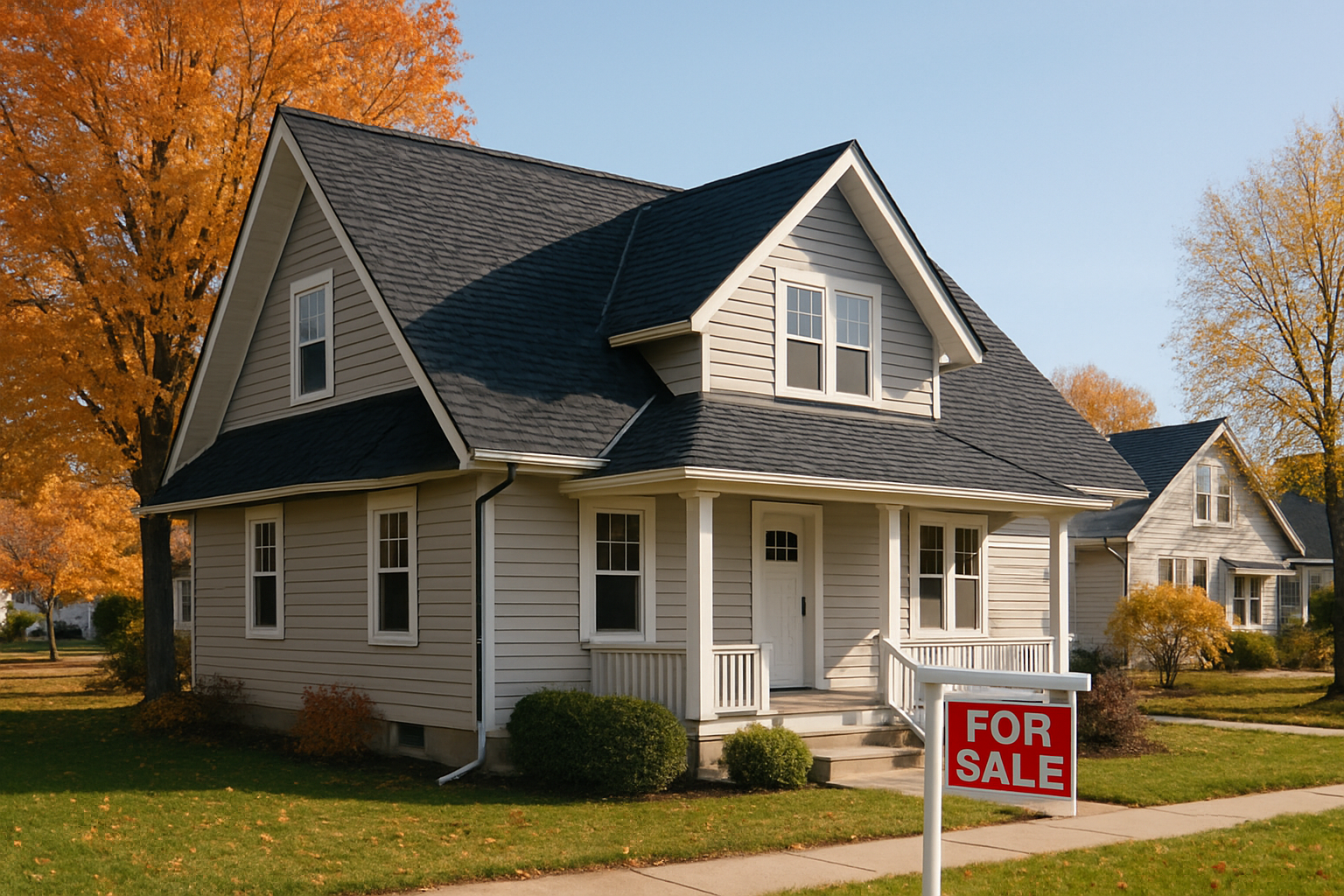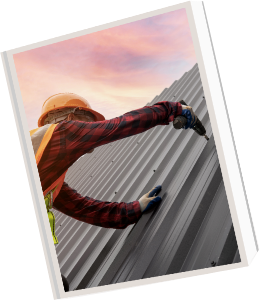Will a New Roof Increase Your Home's Value?

A new roof is one of the biggest investments a homeowner can make. But it raises an important question: Will it actually pay off?
Will it increase the value of your home when it's time to sell, or is it simply necessary maintenance that keeps your house protected but doesn't boost its resale price?
At Happy Roofing, we've worked with many homeowners in the greater Naperville area facing this exact decision. Some are preparing their home for the market, hoping a new roof will attract buyers. Others aren't planning to move right away and want to know if the long-term return will justify the cost.
In this article, we'll break down the factors that affect what value a new roof can add to your home, what components buyers and appraisers pay attention to, and when investing in a roof replacement makes (or doesn't make) financial sense.
Table of Contents
- Can a New Roof Increase Your Home's Value?
- Will a Roof Replacement Help Your Home Sell Faster?
- Should You Replace Your Roof Before Selling Your Home?
Can a New Roof Increase Home Value?
A new roof can increase your home's value in Naperville and the greater Chicagoland area, especially if you're preparing to sell. A well-installed roof improves curb appeal, reassures buyers about long-term protection, and can positively influence your home's appraisal.
Beyond boosting resale value, a new roof also helps reduce buyer objections during inspections and may even speed up the selling process. For homeowners planning to stay, the benefits are different but still important: lower risk of costly repairs, improved energy efficiency, and the peace of mind that comes from knowing your home is protected for years to come.
How Does Roof Condition Impact Home Appraisal Value?
When appraisers assess a home in Naperville or anywhere, for that matter, the roof is one of the key exterior elements they consider. An aging or visibly worn roof can negatively impact your home's value because it signals potential future expenses for the next owner.
On the other hand, a recently replaced roof can add to your appraised value by demonstrating that one of the largest maintenance items on the property has already been taken care of.
Here are a few ways roofing factors into appraisals:
- Roof Age & Condition: Older roofs or visible wear lower perceived value since buyers anticipate repair or replacement costs.
- Recent Replacement: A new roof reassures appraisers and buyers that a major expense has already been handled. This can directly support a higher appraised value since it improves the overall condition rating of the property and reduces deductions for uncompleted maintenance.
- Material Type: Premium systems like architectural shingles, metal, or synthetic roofing may not recoup their cost fully but contribute to perceived quality and durability, especially if documentation can be provided.
How Much Value Can a New Roof Add?
A new roof can add measurable value to your home, often increasing resale potential while improving curb appeal, strengthening appraisal results, and reassuring potential buyers. While you likely won't get the full cost of the new roof recouped, these factors combined can make your home more attractive on the market and help reduce obstacles during the selling process.
What Is The Average ROI of a Roof Replacement?
According to the 2024 Cost vs. Value Report by the Journal of Light Construction, homeowners nationally recoup about 57% of the cost of an asphalt shingle roof (the most common residential roof material) replacement at resale, on average.
For example, spending approximately $30,680 on a roof replacement leads to an estimated $17,461 in increased home value. This amount recouped can be influenced in both directions by a few factors:
What Causes the ROI of a Roof Replacement to Be Higher?
You're likely to see stronger returns on a roof replacement when:
- Your existing roof is visibly aged, contains widespread damage, or is near the end of its lifespan. This is because the perceived value of your existing roof would be lower.
- Inspection issues are likely (like active leaks or damage) and could lead to selling price reductions.
- Your home is in a competitive or upscale neighborhood where buyers expect updated exteriors.
What Causes the ROI of a Roof Replacement to Be Lower?
The financial return of a roof replacement may be less impactful when:
- The existing roof is fairly new (under 15 years old) and still in good condition.
- Changes are purely aesthetic, such as quick overlays or shingle swaps, rather than addressing damage and updating the entire system.
- The local market is more price-sensitive, with buyers open to deferred maintenance.
| ROI Factor | When ROI Is Higher | When ROI Is Lower |
|---|---|---|
| Roof Condition | Roof is aged, damaged, or near end of lifespan – replacement offers visible improvement | Roof is relatively new (under 15 years) and in good condition – less perceived upgrade |
| Inspection Impact | Active leaks or likely inspection issues could reduce selling price – replacement prevents that | No significant inspection concerns – replacement offers minimal additional buyer assurance |
| Market Expectations | Home is in a competitive or upscale area – buyers expect updated exteriors | Price-sensitive market – buyers more accepting of deferred maintenance |
| Scope of Work | Full system replacement addresses real wear/damage | Cosmetic-only changes (e.g., overlay or color swap) with no major improvement |
Will a New Roof Help My Home Sell Faster?
A new roof can make your home sell faster because it removes a major objection for buyers, strengthens curb appeal, and positions your home as "move-in ready." A recent survey found that 68% of buyers consider poor curb appeal a dealbreaker, making a new roof one of the smartest upgrades for attracting buyers.
Even if a roof replacement doesn't return every dollar spent on it, the confidence it instills in buyers often reduces negotiations and shortens its time on the market.
Here are a few key ways a new roof adds value beyond the monetary numbers:
- Buyer confidence and first impressions: A new roof signals to buyers that one of the most expensive parts of the home has already been taken care of, making the property more attractive from the start. It also suggests that the homeowner has likely kept up with other areas of maintenance, which builds confidence that the home has been well cared for overall. For sellers, this can translate into stronger offers, fewer questions during showings, and a smoother path to closing.
- "Move-In Ready" psychology: Homes with new roofs tend to feel low-maintenance and worry-free, which is highly appealing to buyers who don't want to face immediate repair bills. When a property feels turnkey, buyers are more willing to pay closer to asking price and move quickly, helping sellers avoid long listing periods.
- Reduced negotiation pressure: Roof problems frequently show up in pre-sale home inspections, creating leverage for buyers to ask for concessions, credits towards repairs or roof replacement, or a significantly lower asking price. By replacing the roof proactively, sellers remove a common bargaining chip, making it easier to hold firm on price and move through closing without delays.
- Agent recommendations: In competitive markets, a new roof could set a property apart from other listings with old or worn roofs. Real estate agents may even recommend roof replacement before listing, depending on the state of the existing materials, since it helps position the home as a stronger, more competitive option for buyers.
- Extra Benefits: Beyond resale value, new roofs can improve energy efficiency, provide updated warranty coverage, and may even lower homeowners insurance premiums depending on the materials used. These added benefits make the home even more appealing during the selling process.
These factors can make a pre-sale roof replacement a practical way to strengthen buyer confidence, reduce complications during the sale, and help your home stand out in the market—but this is only worth considering if the investment makes financial sense for your situation.
So, Should You Replace Your Roof Before Selling Your Home?
The condition of your roof has the potential to make or break a home sale, but not every home needs a brand-new roof to attract strong offers. In some cases, you can sell as-is. In others, a few strategic repairs or a well-communicated credit for replacement at closing can be just as effective.
To help you decide what's right for your situation, we created a full guide that breaks down which situations roof replacement before listing your home makes the most sense: Should You Fix Your Roof Before Selling Your House?
If you need professional help deciding whether your roof needs repairs, replacement, or nothing at all, contact us for a non-commitment consultation and a thorough assessment of your roof's health, with no obligations to move further.
The Author: Pedro Toledano
Happy Roofing is a trusted roofing company dedicated to providing top-quality roofing services to residential and commercial clients. With years of experience, they specialize in roof installations, repairs, and maintenance, ensuring durability and customer satisfaction. The team is known for their professional approach, timely service, and attention to detail. Happy Roofing prides itself on using high-quality materials and offering competitive pricing. Follow their Facebook page for updates on projects, customer testimonials, and tips on maintaining your roof in excellent condition.




